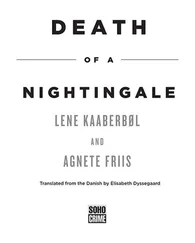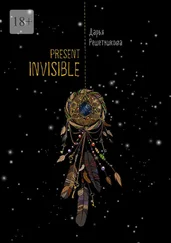Lene Kaaberbol - Invisible Murder
Здесь есть возможность читать онлайн «Lene Kaaberbol - Invisible Murder» весь текст электронной книги совершенно бесплатно (целиком полную версию без сокращений). В некоторых случаях можно слушать аудио, скачать через торрент в формате fb2 и присутствует краткое содержание. Год выпуска: 2012, ISBN: 2012, Издательство: Soho Crime, Жанр: Старинная литература, на английском языке. Описание произведения, (предисловие) а так же отзывы посетителей доступны на портале библиотеки ЛибКат.
- Название:Invisible Murder
- Автор:
- Издательство:Soho Crime
- Жанр:
- Год:2012
- ISBN:9781616951719
- Рейтинг книги:5 / 5. Голосов: 1
-
Избранное:Добавить в избранное
- Отзывы:
-
Ваша оценка:
- 100
- 1
- 2
- 3
- 4
- 5
Invisible Murder: краткое содержание, описание и аннотация
Предлагаем к чтению аннотацию, описание, краткое содержание или предисловие (зависит от того, что написал сам автор книги «Invisible Murder»). Если вы не нашли необходимую информацию о книге — напишите в комментариях, мы постараемся отыскать её.
Invisible Murder — читать онлайн бесплатно полную книгу (весь текст) целиком
Ниже представлен текст книги, разбитый по страницам. Система сохранения места последней прочитанной страницы, позволяет с удобством читать онлайн бесплатно книгу «Invisible Murder», без необходимости каждый раз заново искать на чём Вы остановились. Поставьте закладку, и сможете в любой момент перейти на страницу, на которой закончили чтение.
Интервал:
Закладка:
“They look so damn normal ,” said Lujza, now standing so close to him that he could feel the warmth of her breath against his neck. “So orderly and law-abiding. But those Árpád stripes and double crosses.… Who do they think they’re kidding? Why don’t they just wear swastikas or arrow crosses and be done with it?”
“That’s not just Jobbik,” he said, with a fresh spurt of foreboding. “That’s Magyar Gárda, and they train with weapons.”
Maybe a little of his fear had rubbed off on Lujza. Her outraged aplomb subsided somewhat, and she stood there next to him, letting herself be held.
“Let’s go home,” she said, finally.
I T TOOK THEMalmost an hour and a half. The subway station at Kodály Körönd was closed, presumably for fear the protestors would vandalize its beautiful, historic interior. They had to fight their way through the crowd down to Oktogon and take a tram from there to Rákóczi Square. Lujza put her high heels back on and was quiet and withdrawn the whole way. She didn’t say anything as they walked the last stretch, away from the wide József Boulevard and into the narrower streets of the Eighth District. The afternoon sun burned white against the cracked sidewalk slabs. A Roma family was arranged in their stiffest Sunday best on the stairs in front of Józsefváros Church on Horváth Mihály Street, ready to be photographed.
“Look,” he said. “They just had a baptism, too.”
She nodded but didn’t perk up noticeably. Not even when he suggested coffee and poppy-seed cake from the bakery on the corner.
“I’m tired,” she said. “I just want to go home.”
Lujza lived with three other students in an apartment on Tavaszmezö Street. He knew that didn’t exactly thrill Mr. and Mrs. Szabó, who would have preferred to keep her at home a little longer in the somewhat more upmarket Second District where she had grown up. “But Lujza does what Lujza wants to do,” Papa Szabó had said, resigned.
She didn’t invite Sándor up, and he didn’t push. But after he kissed her on the cheek and was about to leave, she suddenly asked: “Don’t you ever get mad?”
“About what?”
“Them—those idiots—Magyar Gárda and all those other uniformed jerks.”
“Of course. I can’t stand extremists either.”
But he could tell that wasn’t enough. She felt betrayed. He had let her down, in a test that was far more important than making a good impression on her family.
She unlocked the front door to her building and disappeared into the dark foyer.
“See you later,” he called loudly as the door closed behind her. But as he stood there outside the dilapidated townhouse, in his best suit and his neatly polished shoes, he had the disorienting sensation that she was slipping away from him, that the world was about to change, and not for the better.
MAY
 AY HIT BUDAPESTlike a sledgehammer. You could practically see the pavement and the brickwork cracking under the oppressive heat. Sándor ran a finger under the collar of his shirt, trying to unstick the damp fabric from his back. He dropped the second-hand briefcase containing his most recent exam notes onto the top step, balancing it between his feet as he fished around in his pockets for his house keys. Then he discovered that a key was unnecessary because the door was already ajar. Home sweet home, he thought. Disgruntled, he pushed the sagging door open.
AY HIT BUDAPESTlike a sledgehammer. You could practically see the pavement and the brickwork cracking under the oppressive heat. Sándor ran a finger under the collar of his shirt, trying to unstick the damp fabric from his back. He dropped the second-hand briefcase containing his most recent exam notes onto the top step, balancing it between his feet as he fished around in his pockets for his house keys. Then he discovered that a key was unnecessary because the door was already ajar. Home sweet home, he thought. Disgruntled, he pushed the sagging door open.
Szigony Residence Hall had a nice new sign, but that was the only new thing about the place. The university had taken over a couple of the old properties on Szigony Street, but since the demolition gangs were more or less waiting in the wings, no one saw any reason to waste money on maintenance and repairs. Some blocks had already fallen to the bulldozers, and soon this last, crumbling corner would also be part of the Corvin-Szigony project. Palatial office buildings, educational institutions, luxury condominiums, and exclusive shopping centers would rise from the ruins of what most Budapesti considered a “Gypsy slum.” Unless the recession puts a stop to the whole thing, Sándor thought glumly as he tried to get the front door to close again. He had to lift it up a little and then give a sharp jerk.… There! He heard the click.
“Waste of energy,” called Ferenc as he came clomping down the stairs. He lived on the same floor as Sándor and was studying music. “I’m going out. You want to try to shut the door behind me?” It was tricky to shut the door from the inside but near impossible from the outside; most people gave up without even trying.
“Okay,” Sándor said.
Ferenc bounded down the last worn steps at an uneven canter. His hair stuck out wildly in all directions, and he was wearing his beloved double-breasted British blazer despite the summer heat. He had once confided in Sándor that women said it made him look like Hugh Grant.
“We’re going out for a few beers at the Gödör,” Ferenc said. “Why don’t you join us?”
Sándor shook his head. “I’ve got to study,” he said.
“That’s what you always say. Come on, call Lujza. Don’t you think that poor girl would like to get out a bit?”
Sándor could feel a numbness at the corners of his mouth. Novocaine-like. He had seen Lujza just four times since the baptism, and none of those dates had been particularly successful. He felt like he was under attack. She wanted to talk politics and human rights and fascism the whole time. It was suddenly terribly important for her to know what he thought, what he felt, where he stood. Was she afraid he was some kind of closet fascist? Up until the infamous baptism, they used to hold hands and kiss and chat and make love; now every date was like a damn debate. The mere thought of it made Sándor feel clumsy and uncommunicative.
“International law is hell,” he said, because he had to say something. “I’ve only got a few more days to prepare, and it’ll be a bloodbath if I don’t know my stuff.”
“Sándor, for crying out loud,” Ferenc groaned. “You always know your stuff.”
“Yeah, because I cram. It’s called self-discipline.”
“Okay, okay. But your dedication isn’t much fun for the rest of us.…”
Sándor held the door for Ferenc and repeated his door-closing ritual—lift and jerk, and wait for the click.
Then he just stood there.
Come on, he told himself. Go upstairs and study.
It was dark in the high-ceilinged stairwell. One of the windows facing the street was boarded up with sheets of plywood. The other still had most of its colorful stained-glass panes. At one time this had been a beautiful, classic Budapest property, built and decorated by the same craftsmen and artisan metalworkers who had created the mansions in the Palace District by the National Museum. The building had been in a state of disrepair for ages, but in recent years the pace of its decline had picked up as if the building was trying to beat the bulldozers to it. Like a man committing suicide to avoid being murdered, Sándor thought. The plasterwork was peeling off in sheets, and it reeked of dampness, brick dust, and dry rot. The rooms still had four-meter ceilings, but the electricity came and went, the water pipes were corroded and smelled like sewage, and after four months of empty promises and sheets of black plastic, he had ultimately given up and had repaired the window in his room himself.
He thought back to the yelling, stomping Magyar Gárda crowd who wanted to “save Hungary” and the newspapers and TV channels that were full of stories about hard times and unemployment and the risk of national bankruptcy. At the university, everyone was talking nervously about what would happen if the government stopped paying salaries and grants. Soon, there might be no such thing as free education. Or free medical assistance. Or pensions.
Читать дальшеИнтервал:
Закладка:
Похожие книги на «Invisible Murder»
Представляем Вашему вниманию похожие книги на «Invisible Murder» списком для выбора. Мы отобрали схожую по названию и смыслу литературу в надежде предоставить читателям больше вариантов отыскать новые, интересные, ещё непрочитанные произведения.
Обсуждение, отзывы о книге «Invisible Murder» и просто собственные мнения читателей. Оставьте ваши комментарии, напишите, что Вы думаете о произведении, его смысле или главных героях. Укажите что конкретно понравилось, а что нет, и почему Вы так считаете.












